Why Mobile-First App Development Is Essential for Future-Ready Businesses
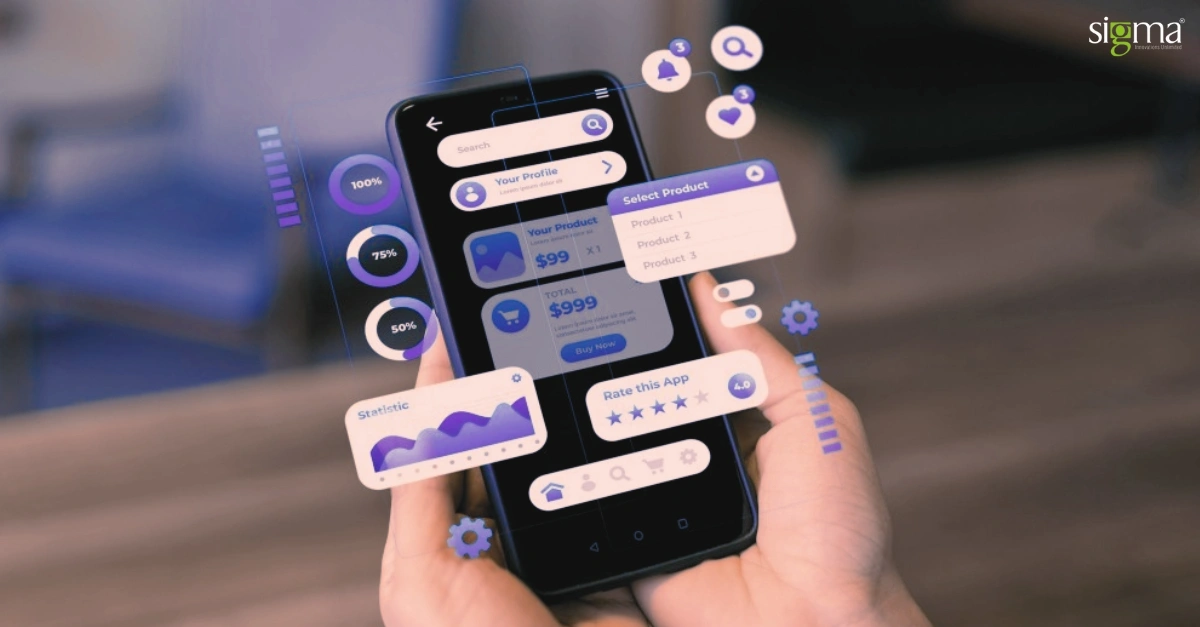
Let’s face it—mobile isn’t just part of the strategy anymore. From Optional to Operational: Mobile Is the CORE STRATEGY. In today’s fast-moving digital economy, mobile-first app development means designing and building apps with mobile users as the top priority—not an afterthought. For future-ready businesses, this shift isn’t optional—it’s survival.
Why? Because the world’s already made the switch. Over 60% of global web traffic now comes from mobile devices. Estimates indicate that revenue from mobile commerce will reach approximately 2.5 trillion US dollars in 2025, nearly doubling over the subsequent four years to encompass 63% of total retail eCommerce. And inside workplaces, the rise of BYOD (Bring Your Own Device) has turned every employee’s phone into a business tool.
So, when businesses still treat mobile as a side project, they’re setting themselves up to lose customers, lose productivity, and lose the race.
Today’s leading brands aren’t just launching apps—they’re building enterprise-grade, cross-platform mobile solutions that run smoothly on Android and iOS, work securely on any device, and scale as fast as their business does.
This is where Mobile App Development Services come in—fueled by innovation in Android app development services, iOS mobile app development, and hybrid app development—to help you stay relevant, competitive, and future-ready.
The Business Case for Mobile-First
Mobile is no longer just another touchpoint—it’s the main screen for your customers!
Think about it—whether it’s shopping, banking, scheduling, or customer support, users want instant access, seamless performance, and intuitive design on mobile. That’s not a “nice-to-have” anymore—it’s the baseline.
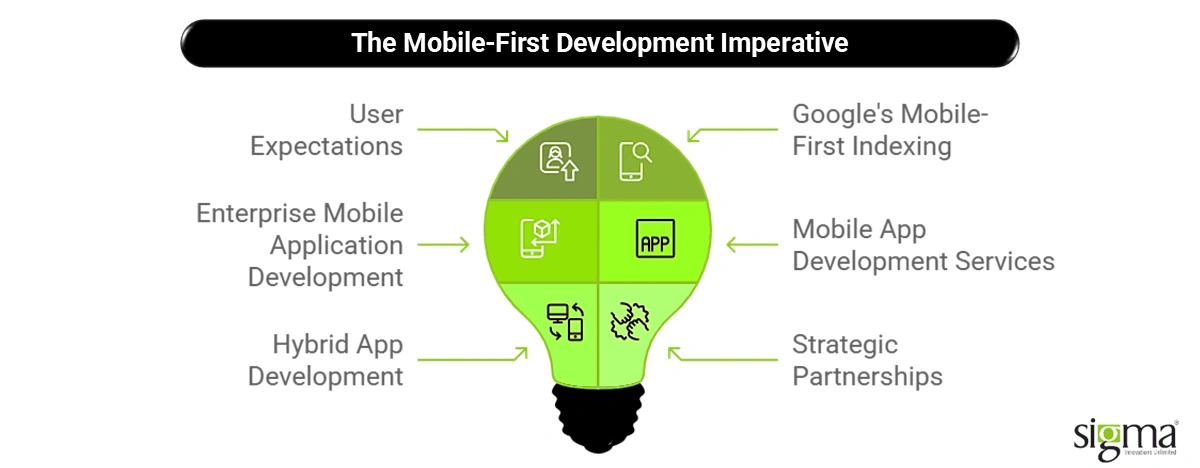
And it’s not just users setting the pace. Google’s mobile-first indexing means your mobile experience now directly affects your search engine rankings. If your mobile app or site is clunky, slow, or outdated, your discoverability takes a direct hit. And let’s be real—if you’re not visible, you’re not even in the game.
This shift is especially important for enterprise businesses. Enterprise mobile application development isn’t about building a simple app—it’s about creating a robust, secure, and scalable mobile ecosystem that can handle complex workflows, integrate with legacy systems, and support a growing user base.
Organizations investing in mobile app development services—especially in cross-platform mobile app development, Android app development services, and iOS app development—gain a powerful edge. They can:
- Respond faster to market changes
- Reach customers where they are (on mobile)
- Improve employee productivity with BYOD-friendly internal apps
- Launch faster across platforms using hybrid app development approaches
By partnering with a hybrid app development company like Sigma Infosolutions that understands both business logic and mobile behavior, enterprises unlock not just agility—but long-term digital strength.
The case for going mobile-first isn’t just strong—it’s unavoidable. Businesses that act now will lead tomorrow.
Here is a glimpse of Sigma’s App Development capabilities: US-based B2C Mobile App and Admin Portal for Digital Payments
Mobile-First vs. Mobile-Friendly vs. Desktop-First: What’s the Real Difference?
Let’s break it down. Not all mobile strategies are created equal, and the wrong one could cost you users, performance, and long-term scalability.

Here’s how each approach stacks up:
Definitions at a Glance
- Mobile-First:
Design and development start with the mobile experience first, then scale up to tablets and desktops. This approach prioritizes speed, clean layouts, and touch-friendly UX from the get-go. - Mobile-Friendly:
The app or site works on mobile devices, but it was initially designed for desktop. It’s more of a retrofit than a rethink. - Desktop-First:
Traditional development that focuses on large-screen desktop layouts and later “shrinks” them to fit mobile—often causing layout issues, slow load times, or confusing navigation.
Why Mobile-First Wins
When you put mobile users first, you unlock real advantages:
- Faster load times: Lightweight mobile-first code reduces wait time
- Better UX: Designed for thumbs, not cursors
- Stronger security: BYOD-ready and scalable across enterprise environments
- Higher engagement: Mobile-first design leads to lower bounce rates
- Simpler scalability: Especially with cross-platform mobile app development services
Mobile Development Approach Comparison
- Feature / Focus
- Design Priority
- Performance
- UX
- Platform Compatibility
- Development Strategy
- SEO and Discoverability
- Mobile-First
- Starts with mobile (small screen)
- Optimized for speed and responsiveness
- Seamless, intuitive mobile interface
- Built with scalability in mind
- Forward-thinking and user-centric
- Preferred by Google (mobile-first indexing)
- Mobile-Friendly
- Starts with desktop, adjusts for mobile
- May suffer from bloat or slow loading
- Adequate but not optimized
- Limited to minor mobile support
- Reactive
- Partial SEO benefits
- Desktop-First
- Designed only for desktop
- Often sluggish on mobile devices
- Typically clunky or awkward on mobile
- Poor cross-platform support
- Legacy-focused and outdated
- SEO risks due to a poor mobile experience
Pitfalls of Retrofitting
Trying to squeeze a desktop-first app into a mobile shell later? That’s like trying to wear a suit that’s two sizes too small.
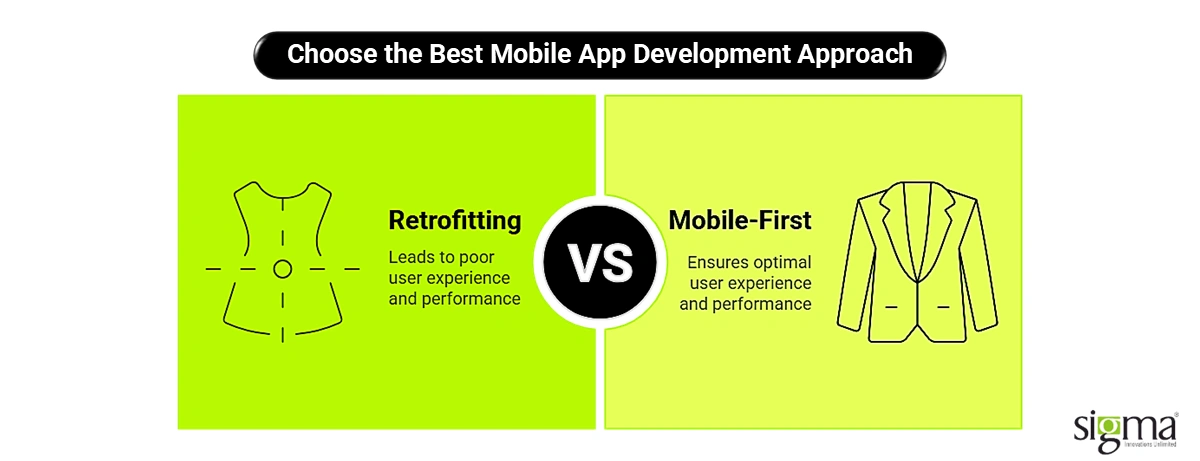
Here’s what you risk:
- Broken layouts
- Slow response times
- Higher bounce rates
- Poor App Store reviews
- Lower rankings in search and app stores
Bottom line? For future-ready businesses, mobile-first isn’t a trend—it’s a strategic necessity. Whether you’re investing in iOS mobile app development, Android app development services, or hybrid app development, starting with a mobile-first mindset ensures your app delivers where it matters most: in the hands of your users.
Future-Proofing Through Mobile-First Development
We’re not just living in a mobile world—we’re racing through a tech revolution. From 5G to AI-integrated apps, the pace of innovation isn’t slowing down—and businesses that embrace mobile-first development are positioning themselves to lead, not lag.
Here’s the big picture: mobile-first isn’t just about better design or speed. It’s a strategic framework for preparing your enterprise for the technologies shaping the future.
Emerging Tech That’s Reshaping Mobile
- 5G enables lightning-fast data transfer for real-time app responsiveness
- IoT allows mobile apps to connect and control smart devices on the go
- Edge Computing powers instant data processing at the device level
- AI-integrated mobile apps deliver smarter personalization and automation
Leverage Sigma’s AI development services for the best outcomes
To tap into these, your apps need to be built with agility, scalability, and performance baked in—and that’s exactly what custom development services for mobile apps, built on a mobile-first foundation, deliver.
How Mobile-First Development Future-Proofs Your Business
- Seamless Cloud Adoption
Mobile-first designs pair perfectly with cloud-native apps—making updates faster and infrastructure lighter. - Omnichannel Readiness
With a mobile-first core, your brand can deliver a unified experience across devices—mobile, desktop, kiosks, wearables, you name it. - Scalable Architecture
Whether you’re targeting 10 users or 10 million, cross-platform mobile app development makes it easy to grow without rebuilding from scratch. - Enterprise Mobility Enablement
Empower your workforce with secure, responsive, and integrated mobile solutions that work with your existing tech stack.
Digital Transformation Needs a Mobile Core
A true digital transformation doesn’t just happen in the cloud—it happens in the pockets of your customers and employees. Mobile-first strategies are essential for companies adopting enterprise mobile application development, aiming for innovation without the burden of legacy systems.
By working with a hybrid app development company or investing in Android app development services and iOS mobile app development, your business stays ahead—ready to integrate with AI, support biometric authentication for finance apps, or deploy cross-platform apps for fintech services.
Native vs. Hybrid vs. Cross-Platform Development: What Should You Choose?
When you’re planning an app for your business, one of the biggest decisions you’ll face is how to build it: native, hybrid, or cross-platform. Each path has pros and cons—and the best choice often depends on your business goals, user base, timeline, and budget.
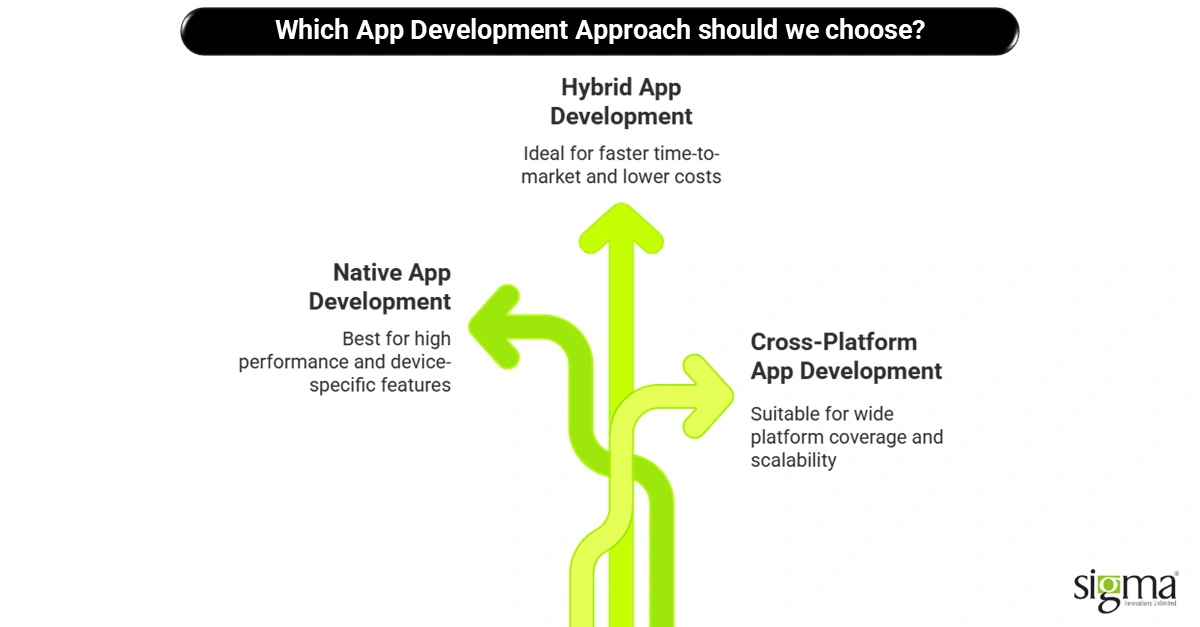
Let’s break it down in plain English.
Native App Development
Native apps are built specifically for a platform—Swift or Objective-C for iOS, and Kotlin or Java for Android.
Best For:
- High-performance apps
- Advanced graphics or device-specific features (e.g., camera, GPS)
- Apps that need to run offline or use intensive processing
Use Cases:
- Secure mobile banking app development
- Retail loyalty apps with barcode scanning and location services
- Field service operations requiring GPS and offline access
Hybrid App Development
Hybrid apps use a single codebase wrapped in a native shell, typically built using frameworks like Ionic or Cordova. Think of it as a “write once, run anywhere” approach.
Best For:
- Faster time-to-market
- Lower development cost
- Moderate performance needs
Use Cases:
- MVPs and proof-of-concept apps
- Retail catalogs or content delivery apps
- Internal enterprise apps with lighter user interaction
We specialize in building scalable hybrid solutions and are recognized as a trusted hybrid app development company.
Cross-Platform App Development
Built with frameworks like React Native, Flutter, or Kotlin Multiplatform, cross-platform apps deliver near-native performance with a shared codebase for iOS and Android.
Best For:
- Brands needing wide platform coverage without doubling dev cost
- Long-term scalability and maintenance
- Consistent UX across devices
Use Cases:
- Cross-platform apps for fintech services
- eCommerce apps with high user volume
- Enterprise productivity tools for remote teams
As a technology partner, we offer cross-platform mobile app development services that ensure native-level performance with faster rollout cycles.
Native vs. Hybrid vs. Cross-Platform
- Feature / Approach
- Codebase
- Performance
- Time to Market
- Cost
- Device Access
- UI/UX Quality
- Maintenance
- Best For
- Native
- Separate for iOS & Android
- Excellent
- Long
- High
- Full (deep integration)
- Platform-optimized
- Requires double effort
- High-end apps, gaming, and finance
- Hybrid
- One shared codebase
- Moderate
- Fast
- Low
- Limited to plugins
- May feel generic
- Easier (single codebase)
- MVPs, simple enterprise tools
- Cross-Platform
- One shared codebase
- High (near-native)
- Moderate
- Moderate
- Good with plugins & APIs
- Highly customizable
- Easier (single codebase)
- Scalable B2B apps, fintech, retail
Our Expertise
Whether you’re looking for custom mobile app development, Android app development services, iOS mobile app development, or full-blown enterprise mobile application development, we’ve got you covered. Our teams have deep expertise across:
- Native iOS & Android development
- Hybrid frameworks (Ionic, Cordova)
- Cross-platform tools (Flutter, React Native, Kotlin Multiplatform)
We work with enterprises across finance, retail, and field operations to deliver secure, scalable, and performance-optimized apps that meet today’s demands—and tomorrow’s expectations.
Mobile-First Design for Enterprise Use Cases
Mobile-first development isn’t just about user convenience—it’s about business enablement at scale. When designed with enterprise goals in mind, Mobile App Development Services can transform how entire industries operate—on the move, in real time, and with complete security.
From finance to field service, here’s how mobile-first thinking delivers the flexibility and power modern enterprises need.
Finance: Security, Compliance & Trust
In a mobile-first world, financial services must deliver more than just functionality—they must build trust. That’s where secure mobile banking app development and biometric authentication for finance apps come into play.
Mobile-first benefits in finance apps:
- Military-grade encryption and multi-factor authentication
- Seamless user journeys for account access and transactions
- Biometric logins (fingerprint, face ID)
- Push notifications for real-time account alerts
We deliver iOS app development and Android app development services tailored to meet strict financial compliance standards.
Healthcare: Care Beyond the Clinic
With the rise of telehealth, mobile-first design helps healthcare providers deliver remote patient care through HIPAA-compliant mobile apps.
Enterprise mobile application development services in healthcare focus on:
- Secure patient-doctor messaging
- Real-time health monitoring via wearables
- E-prescriptions and virtual appointments
- Access to medical history on the go
Logistics: Real-Time Visibility
For logistics businesses, being mobile-first means fewer delays, fewer mistakes, and more visibility in the supply chain.
Key logistics use cases:
- Live inventory tracking and barcode scanning
- Driver navigation and optimized route planning
- Delivery confirmations with digital signatures
- Offline data sync for no-coverage zones
Our hybrid app development and cross-platform mobile app development services help logistics firms reduce delivery gaps and manual effort.
Field Service: Empowering Remote Teams
Field operations depend on access—whether it’s data, forms, or checklists. Mobile-first apps built for field teams improve both productivity and accountability.
Field service app must-haves:
- Offline access to critical job info
- GPS tracking and route logging
- Photo uploads and voice-to-text notes
- Real-time task updates and reporting
Across industries, responsive UI/UX, scalability, and offline functionality are non-negotiables—and that’s exactly what mobile-first app development delivers.
Cost & Time Efficiency with Hybrid and Cross-Platform Apps
In today’s competitive digital landscape, speed and cost-efficiency can be game-changers—especially when you’re scaling across markets and platforms. That’s why businesses, from nimble startups to large enterprises, are turning to hybrid app development and cross-platform mobile app development services.
The biggest win? One codebase, multiple platforms—meaning you can launch on both Android and iOS without building from scratch for each. Imagine the impact when a mobile-first approach leads to 4.3% higher medical spending from users who can easily access and utilize services. This isn’t just a hypothetical; it’s a proven outcome for businesses embracing mobile-first strategies, being our client.
Key Benefits of Hybrid & Cross-Platform Apps:
- Reduced Development Cost: Cut infrastructure and team expenses by maintaining a single codebase across platforms.
- Faster Go-to-Market: Build once, test once, deploy twice—speeding up launch cycles for Android app development services and iOS app development.
- Easier Maintenance & Updates: Push updates to all platforms simultaneously, reducing downtime and customer complaints.
- Scalable ROI: Lower total cost of ownership + faster launch = higher and quicker returns.
Real-World Scenario
As consumers increasingly rely on their smartphones for everything from communication to commerce, optimizing your digital presence for mobile devices is no longer an option; it’s a necessity. This shift is evident in the remarkable 36% growth in mobile transactions, underscoring the undeniable power of a seamless mobile experience.
Ignoring mobile-first app development means missing out on a massive and growing segment of your audience, hindering potential growth, and failing to meet evolving customer expectations. Future-ready businesses understand that being accessible and functional on mobile devices translates directly into increased engagement, higher conversion rates, and ultimately, greater success.
For a real-world example of how mobile-first strategies drive significant results, explore our case study: Transforming Online Retail for German and Central European Foods.
App Performance Optimization & Security Best Practices
When it comes to Mobile App Development Services, delivering a fast and secure user experience isn’t optional—it’s expected. Poor performance leads to high bounce rates, and weak security can destroy customer trust in seconds.
Here’s how we help businesses optimize their apps for both Android and iOS, without compromising on speed or security.
Performance Optimization Tips
- Lazy Loading: Load only what the user needs, when they need it—improves initial load time.
- Code Splitting: Break large code into smaller chunks so the app runs smoothly.
- Asset Optimization: Compress images, videos, and static content to reduce bandwidth usage.
These strategies directly support App performance optimization for Android and iOS, helping apps run faster across devices and networks.
Security Best Practices
- Biometric Authentication: Secure access with Face ID, Touch ID, or fingerprint sensors—especially vital for secure mobile banking app development.
- Data Encryption: End-to-end encryption ensures user data is protected during transmission and at rest.
- Secure APIs: Implement token-based authentication and role-based access to avoid breaches.
We’ve built high-performance, enterprise-grade apps for fintech, healthcare, and logistics—scalable, responsive, and bulletproof from day one.
Whether it’s custom mobile app development, iOS app development, or hybrid app development, our solutions are designed to scale securely and perform flawlessly under pressure.
Choosing the Right Mobile App Development Partner
Building a successful mobile app isn’t just about writing code—it’s about choosing a partner who understands your business, your users, and the ever-evolving tech landscape.
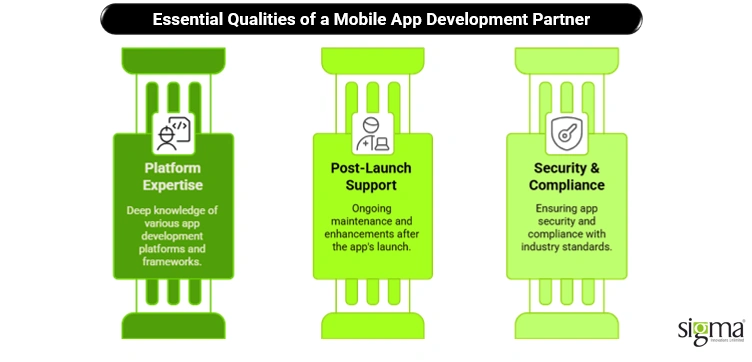
So, what should you look for?
Must-Have Qualities in a Mobile App Development Partner:
- Platform Expertise: Deep knowledge of Android app development services, iOS mobile app development, and hybrid app development frameworks like Flutter, React Native, and Ionic.
- UI/UX Capabilities: Design-first thinking that delivers intuitive, responsive, and accessible mobile experiences.
- Post-Launch Support: Ongoing maintenance, performance tuning, and feature enhancements—because launch day is just the beginning.
- Security & Compliance: A track record in building apps with secure APIs, biometric authentication, and encryption for industries like finance, healthcare, and logistics.
At our core, we are a US-based technology services company with cross-functional teams specializing in custom mobile app development. Our engineers, designers, and QA experts work hand-in-hand to bring your vision to life—from concept to scalable, enterprise-ready product.
We don’t just build apps—we build digital assets that perform, scale, and deliver business value. That’s why clients across sectors trust us to lead their enterprise mobile application development initiatives.
Whether you need a robust enterprise solution or a sleek consumer-facing app, we’ve got the expertise to get you there—fast, securely, and cost-effectively.
Mobile-First Is Business-First
A mobile-first app development strategy isn’t a fleeting trend—it’s a non-negotiable for future-ready enterprises. As user behaviors shift, technologies evolve, and digital experiences go mobile-first, the businesses that win will be the ones who build for mobile from the start.
If you’re a CTO, CIO, or business leader looking to drive digital transformation, enhance customer engagement, or scale securely across platforms, now is the time to act.
Build your next-gen enterprise app with us.
Our team specializes in Mobile App Development Services designed to deliver performance, scalability, and security—across iOS, Android, and hybrid platforms.
Talk to our mobile-first experts today and bring your app vision to life.